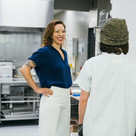Table of contents
Compared to other industries, restaurants have always faced high levels of staff turnover. Recently, this trend has accelerated. According to the U.S. Bureau of Labor Statistics, 2022 quit rates and hiring rates were higher in restaurants than in any other industry.
This may mean you’re working with fewer employees even during your busiest shifts and investing more time in developing inexperienced staff. To meet this challenge without sacrificing your quality of service or reducing your margins, you will need to implement strategies to support your team while they learn.
Streamline your offerings
Restaurant employees need to have varied skill sets and a wide breadth of knowledge. Beyond learning the ins and outs of the restaurant itself, just some of what staff members need to know include:
- Ingredients in different menu items
- Potential allergens
- Different types of liquors and speciality cocktails offered
- Non-alcoholic beverage options including coffee and tea
- The wine list (by the glass and by the bottle).
- Best wine pairings for different dishes
- Substitutions allowed by the kitchen
- Plating of different dishes and whether guests will need to be marked (i.e., with soup spoons or steak knives) before their food arrives
And the specifics of all this knowledge may change between breakfast, brunch, lunch, and dinner shifts.
Your staff has a lot to learn.
One way you can help them is by simplifying your menus, which can lead to a number of benefits for both the front of the house and the back of the house:
- Focused training – Smaller menus mean new employees spend less time studying and more time doing. It also allows you to focus your training on how your restaurant runs. This can help integrate new team members quickly and effectively.
- Higher quality – One reason less experienced staff can be a hindrance to your operations is that it’s much easier for them to become overwhelmed. By streamlining your menu, new hires can focus more on how to do things correctly instead of trying to remember what it is they should be doing in the first place.
- Cost savings – Thirty-one percent of restaurants have already reduced their menu size in response to inflation. Fewer offerings mean less overhead and potentially less food waste, allowing you to keep costs down and stay competitive with your pricing.
- Creativity – One possible downside of a reduced menu is the potential for your chef (or your customers) to feel that your offerings are becoming stale. However, by utilizing techniques such as daily specials, you can still engage your chef’s creativity and introduce seasonal items gradually.
Utilize the experience you have
Since staff is becoming less experienced overall, it is important to deploy more experienced team members where they can be most effective. Their knowledge and experience make them invaluable as you bring newer team members up to speed. Some ways to best utilize them include:
- Schedule smartly – There are many different ways to schedule team members effectively. It’s important to find a system that works for your needs and keeps staff members happy. Scheduling software such as Square Shifts can help you achieve these goals and make sure you’re deploying your team in the most effective ways possible.
- Consider captains – Restaurant captains can serve as shift leaders and provide much-needed support to your management staff. By assigning experienced team members to this role, you can be sure your newer staff has the support they need, even during shifts when management is stretched thin.
- Tighten training – The primary period of time for you to get a new hire ready to work is their training period. Be sure you’re using this time wisely. Audit your training processes and implement the most effective techniques to ensure that when your new hires start working, they are ready. Better training can also lead to greater staff retention, which will continue to reap benefits down the line.
Focus on your customers
Even if you do everything right, less experienced staff will still be prone to errors. One way to be sure that these errors don’t affect customer experience is to show your customers how much they mean to you.
Promotions can help you attract new customers and keep them coming back. By automating your marketing, you can be sure these promos are going out at the times when they will be most attractive. You can also consider a loyalty program to show your regulars how much their continued support is appreciated.
Your customers keep your business running. By showing them how much they mean to you, they’ll remain loyal and even become supportive advocates that exemplify what makes your restaurant special.
New staff as an opportunity
Newer staff, while lacking industry knowledge, often provide great enthusiasm and a willingness to learn. By providing them with the support they need to succeed, you’re allowing them to build customer relationships that will sustain your business.
This can be a challenge, but it is also an opportunity to assess your current operations and implement techniques that will lead to success both now and in the future.
![]()











